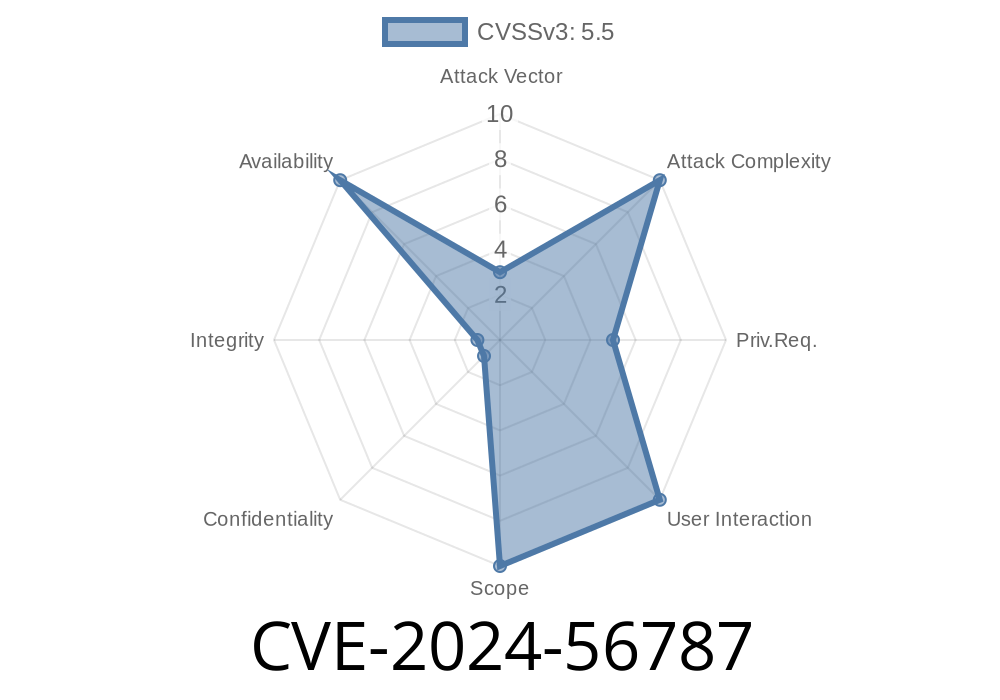In June 2024, a critical Linux kernel bug affecting the NXP i.MX8M family of System-on-Chips (SoCs) was discovered and fixed. CVE-2024-56787 responded to an issue in how the kernel probed the SoC driver during boot when using specific kernel command-line options.
This long-read will break down what happened, why it matters, the technical details, and how the problem was ultimately patched—using clear, accessible language for developers and system maintainers.
TL;DR Summary
- If you booted Linux with driver_async_probe=*, the i.MX8M SoC driver could fail during initialization due to missing clock dependencies.
It affects boards running NXP i.MX8M chips.
- CVE-2024-56787 forced the i.MX8M SoC code to be a proper platform driver, solving dependency ordering.
The Background: SoC Probing and Clock Dependencies
On embedded Linux, especially on ARM platforms like NXP's i.MX8M (popular in industrial and IoT boards), the kernel discovers "which SoC am I running on?" via SoC drivers in drivers/soc/.
The soc-imx8m.c code needs to read the chip revision, but relies on clocks being set up (drivers probed and ready). If the clocks aren’t available, the function returns -EPROBE_DEFER, telling the kernel: “Please try again later, that dependency isn’t loaded yet.”
Normally, kernel device probes are sequenced so dependencies come in order. But with driver_async_probe=* (an advanced boot option that parallelizes driver loading for faster boots or testing), the order can break.
Example Kernel Trace
------------[ cut here ]------------
WARNING: CPU: 1 PID: 1 at drivers/soc/imx/soc-imx8m.c:115 imx8mm_soc_revision+xdc/x180
...
Call trace:
imx8mm_soc_revision+xdc/x180
imx8_soc_init+xb/x1e
do_one_initcall+x94/x1a8
...
SoC: i.MX8MP revision 1.1
If your boot log looked like that — you hit this bug.
Before: Non-Platform Driver
The probe logic was invoked at device_initcall() time, not as a proper platform driver. Asynchronous probe revealed unhandled -EPROBE_DEFER:
// BAD: Not handling deferred probe well
static int __init imx8_soc_init(void) {
int ret = imx8mm_soc_revision();
if (ret < )
WARN_ON(1);
...
return ;
}
device_initcall(imx8_soc_init);
After: Platform Driver Conversion
The fix was to convert it to a proper platform driver. Platform drivers are designed to handle -EPROBE_DEFER, so if a dependency is missing, the kernel will retry the probe once it's ready.
Simplified pseudo-code
// GOOD: Platform driver handles dependency ordering
static int imx8m_probe(struct platform_device *pdev)
{
int revision;
int ret = imx8mm_soc_revision(&revision);
if (ret == -EPROBE_DEFER)
return -EPROBE_DEFER;
if (ret < )
return ret;
...
return ;
}
static struct platform_driver imx8m_driver = {
.probe = imx8m_probe,
...
};
module_platform_driver(imx8m_driver);
This enables Linux to retry probing until all dependencies (like clocks) are present.
Exploitation is limited, but...
While this bug is NOT a classic "attack vector" with remote or local code execution, stability problems or a failure to boot could be triggered easily by manipulating the kernel boot command line (with driver_async_probe=*).
A malicious or careless user with bootloader access could make systems unreliable on vulnerable kernels.
- Impact: System hangs, incorrect SoC identification, disrupted device tree/bus probing.
- Not directly privilege-escalation or code execution. Rather, it’s a denial-of-service pathway if misused in multi-user products.
Who Is Affected?
- Embedded Linux distros for NXP i.MX8M (Quad/Plus/Mini/Nano).
How Can I Fix or Detect the Issue?
1. Check your kernel version: You’re safe on mainline v6.11 (commit 2062bb554dea), or patched downstream.
2. Audit device logs: Look for boot traces with WARNING at soc-imx8m.c, particularly if using driver_async_probe=*.
Update your kernel: Get the fixed version from
Your SoC vendor BSP tree
4. Remove driver_async_probe=* from your boot options if you're not actively using/testing it.
References and Further Reading
- Upstream patch: soc: imx8m: Probe the SoC driver as platform driver
- Linux kernel device driver model documentation
- NXP i.MX8M Product Page
Final Thoughts
This issue is a perfect example of why subtle *dependency management* bugs can have big impacts, especially in the world of embedded Linux. If you’re deploying or maintaining devices on i.MX8M, you need this fix (CVE-2024-56787).
Don’t ignore warning traces — this one could trip you up on your next factory reset, prototype boot, or customer shipment!
Timeline
Published on: 01/08/2025 18:15:19 UTC
Last modified on: 01/09/2025 21:28:12 UTC
